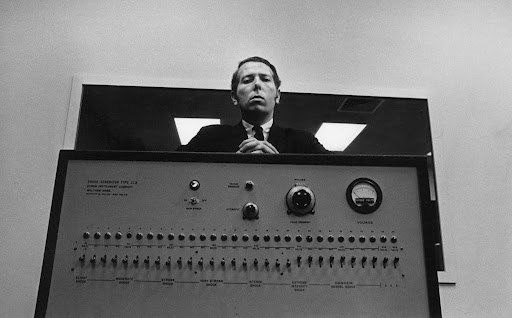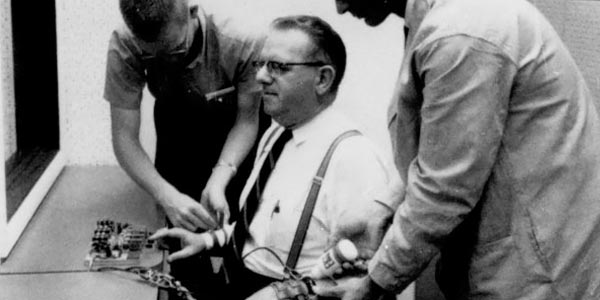Fifty years after Stanley Milgram’s “Obedience” study at Yale shocked the world, there’s dispute as to whether the Milgram experiment actually proved casual inhumanity is our default mode. Technologists like Jonah Peretti swear by Milgram, whereas others have begun to swear at him. From Cari Romm at the Atlantic:
To mark the 50th anniversary of the experiments’ publication (or, technically, the 51st), the Journal of Social Issues released a themed edition in September 2014 dedicated to all things Milgram. “There is a compelling and timely case for reexamining Milgram’s legacy,” the editors wrote in the introduction, noting that they were in good company: In 1964, the year after the experiments were published, fewer than 10 published studies referenced Milgram’s work; in 2012, that number was more than 60.
It’s a trend that surely would have pleased Milgram, who crafted his work with an audience in mind from the beginning. “Milgram was a fantastic dramaturg. His studies are fantastic little pieces of theater. They’re beautifully scripted,” said Stephen Reicher, a professor of psychology at the University of St. Andrews and a co-editor of the Journal of Social Issues’ special edition. Capitalizing on the fame his 1963 publication earned him, Milgram went on to publish a book on his experiments in 1974 and a documentary, Obedience, with footage from the original experiments.
But for a man determined to leave a lasting legacy, Milgram also made it remarkably easy for people to pick it apart. The Yale University archives contain boxes upon boxes of papers, videos, and audio recordings, an entire career carefully documented for posterity. Though Milgram’s widow Alexandra donated the materials after his death in 1984, they remained largely untouched for years, until Yale’s library staff began to digitize all the materials in the early 2000s. Able to easily access troves of material for the first time, the researchers came flocking.
“There’s a lot of dirty laundry in those archives,” said Arthur Miller, a professor emeritus of psychology at Miami University and another co-editor of the Journal of Social Issues. “Critics of Milgram seem to want to—and do find—material in these archives that makes Milgram look bad or unethical or, in some cases, a liar.”•
_________________________________
“Oh, I’m not going to kill that man.”
Tags: Cari Romm, Stanley Milgram


